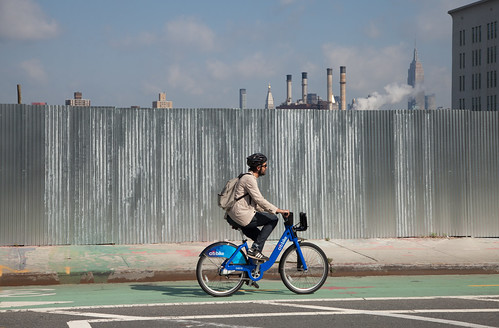The "solution" for NYC's need for money to subsidize bike sharing: charging for residential parking permits
Granted, parking is the third rail of local politics and no way will the elected officials there want to bring this up, let alone vote in favor of a new program to charge for residential parking permits.
 Flickr photo of a Citibike rider in NYC by Several Seconds.
Flickr photo of a Citibike rider in NYC by Several Seconds.As discussed yesterday, the New York City bicycle sharing system is having a difficult time operating on a financially positive basis and a NYT op-ed suggested that the program be "subsidized" comparably to other transportation modes like roads and transit.
That requires money.
Residential parking permit pricing around North America. For the most part, cities don't charge enough for residential parking permits. In DC it is about $35/year. A few cities like San Francisco, Seattle and Vancouver charge a bit more, but under $100--in Seattle and Vancouver the price varies according to neighborhood, based on supply and demand.
Toronto charges from about $14 to $50 per month, depending on whether or not the dwelling unit has separate off-street spaces.
The highest price that I've come across in the US appears to be in Miami Beach. They price by zone in a differentiated fashion depending on supply and demand, and the absolute highest price seems to be about $230/year. (It's hard to say because the city doesn't publish a master schedule of all the rates by zone.)
But New York City doesn't have residential parking permits, let alone charge. Also see "5 Reasons Why New York City Needs a Residential Parking Permit Program" from the Tri-State Transportation Campaign.
New York City. According to Streetsblog ("New York Has 81,875 Metered Parking Spaces, And Millions of Free Ones" and "Study: City Residential Parking Requirements Lead to More Driving") there are between 3.3 and 4 million unmetered "residential" parking spaces in the five boroughs of New York City.
As of 2013, there were 1.8 million cars registered to New York City addresses, although many are likely to have off-street parking spaces.
Carroll Gardens, Brooklyn.
Even if only half the cars use on-street spaces, permits priced at $100/year would generate $90 million. Figuring administration costs of 20% that would still leave close to $70 million/year in net additional revenue.
As Donald Shoup writes about parking (what I prefer to think of as transportation) districts ("Turning small changes into big changes"), you can use the revenues generated to make transportation and public space improvements in those districts in a systematic way.
One element of such improvements could include financial support for bike share.
Labels: bicycle sharing, car culture and automobility, parking and curbside management, transportation planning




1 Comments:
This is a nice post.
This post is about charging for residential parking permits.
The standards of feasible urban vehicle stress the requirement for urban communities that advance open and non-mechanized vehicle and wean individuals from utilizing their own modes, for example, bikes and autos.
Post a Comment
<< Home